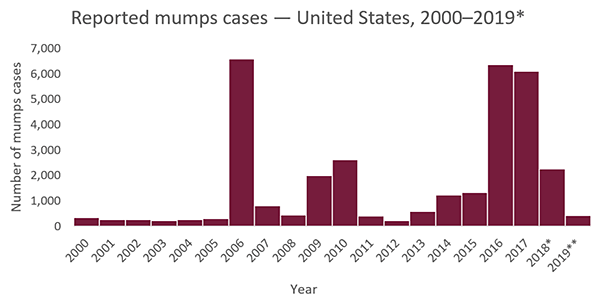A mumps outbreak at Temple University has over 100 students fighting the illness and thousands of others lining up for a measles, mumps and rubella vaccine, according to Delaware Online. Are students on the BGSU campus immune from the possibility of a similar outbreak?
The Center for Disease Control explains college campuses are ideal breeding grounds for viral illness like the mumps, with students living in close quarters and not always practicing anti-germ precautions. There’s also a concern about the vaccinations in the target age demographic.
“Maybe some of those college students are losing their immunity to the mumps. It can happen. In an outbreak, they always recommend a booster,” said Kathy Teeple, RN, public health nurse for the Wood County Health Department.
While the efficacy of the MMR vaccine is relatively high — for mumps specifically it is 95%-97% after two doses — anyone born in the early 1990s is at a higher risk because vaccine handling was different. Teeple explains vaccines are fragile and require specific handling.
“There is a little bit of concern for that age demographic, because vaccine handling procedures have changed, especially recently. So that age demographic, the vaccine may not have been stored or transported at proper temperatures. If the vaccine falls out of that range for even a short period of time it can affect vaccine efficacy,” WCHD epidemiologist Tyler Briggs said.
He added recently the control practices for transport and storage of vaccines have tightened. Now vaccines must be kept within a few degrees in temperature.
But those practices may have been the cause of the CDC reported spike in mumps cases every five years since 2006, Briggs said. The last three years have seen a consistently high number of cases. There were between 5,000-6,000 cases in both 2016 and 2017, the highest number of cases since 2006. The data isn’t complete for 2018 or 2019 yet, but both have trends toward a high number of cases.
Penn State University has also had two confirmed cases and at least one suspected case this spring, according to CBS-affiliate WTAJ-TV in Altoona, Pennsylvania. This is the third year in a row the university has had the illness visit campus.
Different universities have different immunization requirements for admission. The Ohio State University requires proof incoming students have had the full set of recommended vaccinations before the start of classes. The University of Toledo only requires incoming students have the two doses of the MMR vaccine for admission. Temple University, where they are facing a large outbreak, only requires the meningitis vaccination for those who plan on living on campus.
Penn State University stands behind the concept of vaccination.
“Immunizations offer safe and effective protection from vaccine-preventable diseases. The United States is experiencing re-emergence of many diseases, in part due to factors such as non-immunized and under-immunized persons and global travel. Penn State, along with University Health Services, strongly supports the use of vaccines to protect the health of individual students and the campus community as a whole,” Penn’s website reports.
It goes on to inform students if they choose to attend the university without the protection of vaccinations, the university reserves the right to remove them from campus in the case of an outbreak. This is for both the safety of the unvaccinated student and the community, Briggs explained.
“In Ohio, non-vaccinated students can be excluded from classes for up to two incubation cycles after the last outbreak of a disease. In a college setting that could prove disastrous,” he said. “With the mumps, that could be as much as 45 days.”
Sara Bednarski, BGSU director of communications, explained BGSU does not have a vaccination requirement for attendance.
“At BGSU, we ask students to self-report vaccinations and immunizations. While we don’t have requirements, we do recommend Hepatitis B and Meningitis. This information is captured in the Housing portal,” she said.
Briggs and Teeple said they are ready for any outbreak Wood County may see. They recommended college students stay aware of the signs and symptoms of mumps.
“It’s pretty hard to miss. The swollen glands give it away. It isn’t like anything else you have ever seen,” Teeple said.
Briggs added some of the symptoms may mimic other viral illnesses and sometimes it makes early detection more difficult. It is harder to transmit than the measles, though.
“If there is no exposure, vaccination isn’t going to matter. If you are exposed and you aren’t vaccinated, your chances of getting sick are a lot higher. Mumps requires close contact exposure. You have to come into contact with saliva. With measles, if someone sneezes in the room there is a high possibility you can get sick,’ Briggs said.
He also explained the mumps’ longer incubation period could explain why it spreads so easily on college campuses.
“Mumps’ incubation period is upwards of fortyish days, the average is 28 days. That makes it hard to track where the person has been. When you ask a person where they have been for the last 40 days — we get a lot of ‘I don’t know,’” he said.
Teeple feels Temple University is taking the right step in offering a vaccination clinic. She adds an extra dose won’t hurt anyone.
“The problem is no shot is 100% effective. I’ve had the mumps. It’s better to go get checked than to wait and see,” Teeple concluded.














